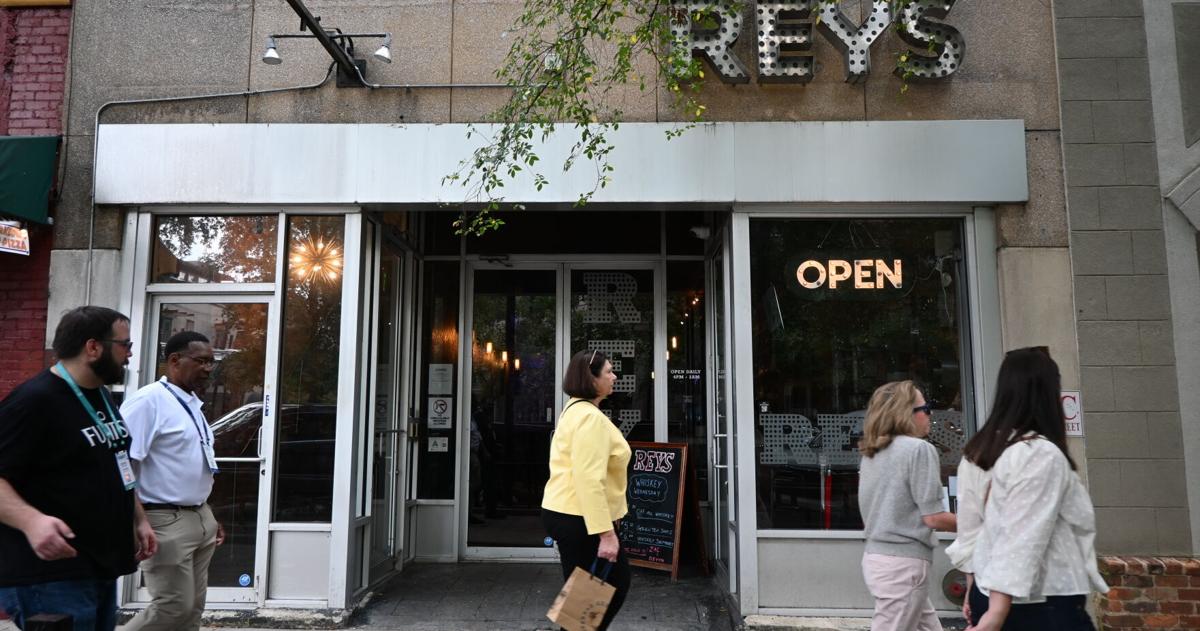
GREENVILLE — Reys, the longtime downtown restaurant and bar, will live to serve another day after Greenville’s Board of Zoning Appeals spared it from severe punishment for violating late-night rules.
Reys won a split decision after city staff attempted to revoke its permit to operate after midnight for its violations. The business’ owners said would have effectively put them out of business.
The Board of Zoning Appeals said staff went too far by trying to revoke the permit entirely, but it still said Reys deserved to be punished for clear violations, such as hiring DJs and failing to serve food. It settled on a 45-day suspension, meaning Reys won’t be able to operate after midnight until mid-November.
“We can probably survive this,” said Tim Kearns, who helps his wife, Jessica, operate Reys.
“We messed up, we pay the price,” he said. “You got to set an example, and we just have to be the first people to get dealt the blow.”
The dispute was sparked by a string of fights downtown captured on video and shared widely on social media. City staff linked at least one of the fights to Reys and said a subsequent investigation found the business had violated its special exception permit.
“Special exceptions are that: They’re special. It’s not a given to operate after midnight in Greenville,” said Mary Douglas Hirsch, the city’s director of planning and development.
Reys’ owners, Jessica Kearns and her husband Tim, defended the business, saying its mistakes were unintentional and not as serious as the city made it seem. In a letter to the Board of Zoning Appeals, they also contended the revocation was part of an effort to pressure businesses to close early.
“There must be a process for correction and progress, not punishment so severe that it ends a business in the snap of a finger,” Jessica Kearns told Board of Zoning Appeals members. “… The reality is that this will not solve the city’s late night challenges.”
After two hours of debate, the Board of Zoning Appeals voted unanimously to suspend Reys’ permit for 45 days — not long enough to shut the business down, but enough to send a message.
“I do think we need to send a signal, not only to these folks, but to every bar in town,” board chair Ken Betsch said.
The dispute puts a spotlight on the city’s approach to night life as officials, residents and businesses decide how to best balance the growing late-night activity in Greenville with the rising number of people who want to live downtown.
A 4 a.m. burglary on Main Street that coincided with a series of downtown fights captured on video and shared on social media stirred concerns about safety over the summer.
The city says those incidents are not part of any trend toward more violence or disorder, and data shows that crime is decreasing in the city overall.
Yet the city also made subtle changes to its late-night policies in recent months and is intentionally increasing enforcement of late-night rules.
Communications Director Beth Brotherton previously told The Post and Courier that the city sent formal notices to over 100 businesses in recent months and is hiring a new, part-time Central Business Inspector tasked with monitoring compliance downtown. The efforts are part of developing a “long-term strategy to ensure downtown remains safe and vibrant.”
“Businesses agree to abide by conditions when a permit is granted. Robust enforcement is an important piece of compliance,” Brotherton wrote in an emailed response to questions before the Board of Zoning Appeals meeting. “… A business that does not address issues after multiple warnings is rare, but will have its permit revoked.”
The Board of Zoning Appeals, however, suggested the punishment didn’t fit the crime.
What did Reys do wrong?
The city’s attempt to revoke Reys’ permit is directly related to the string of downtown fights, Principal Development Planner Kristopher Kurjiaka told the Board of Zoning Appeals.
After videos of fighting went viral in early August, staff determined that at least one of the fights involved patrons from Reys, Kurjiaka said. Staff then began an investigation and found evidence the business was violating its special exception permit.
Staff discovered social media posts that showed DJs playing at Reys — violating a ban on interior sound amplification — and determined there was no menu on the business’ website, indicating no food was served and that the business was operating as a bar.
On Aug. 13, city staff presented Kearns with evidence of the violations. Kearns says she was unaware that hiring DJs was against the rules and immediately agreed to stop. Kearns told city staff there was food available, though, even though no menu was posted.
On Aug. 15, Greenville police sent two “plain clothes operatives” to Reys at 10:25 p.m. They ordered an alcoholic drink and inquired about food. The bartender told the operatives no food was served at the location and recommended other nearby restaurants, according to the city.
Kearns said that was an isolated incident, blaming it on Reys’ manager having to leave work for an emergency.
Kurjiaka, however, said staff didn’t consider it a coincidence that two days after warning Reys of violations, they found it wasn’t serving food. They decided to act.
On Aug. 22, the city sent another letter to Reys revoking the permit effective immediately. Reys quickly appealed the decision, and the dispute landed in front of the Board of Zoning Appeals.
“Compliance with these permits helps us maintain a sometimes tenuous balance of entertainment and safety in the late night hours in our downtown and across the city,” Kurjiaka told Board of Zoning Appeals members. “The failure of Reys to abide by their permit, and misrepresentation of their operations, runs contrary to the city values, and in this case, has necessitated this course of action by zoning enforcement.”
Why did the Board of Zoning Appeals side with Reys?
From the beginning, board members sounded skeptical.
They questioned why staff focused on just a few violations in a short period of time and leapt to revoking the permit without exploring other punishments.
“This, to me, feels a little bit out of proportion, especially since there were other options that the administrator could have taken,” board member Sam Davis said. Businesses can be warned, cited or have their permit suspended.
Only five businesses have had their permit revoked since 2000, according to the city. Most of those permits were revoked after serious episodes, like the deadly shootings at 821 Greenville or Red at 28th.
However, board members also said it was clear Reys violated the terms of its permit and needed to be punished.
“I don’t think we should be taking violations of our special exception permit lightly,” said board member Mark Herro, who pushed other members to consider a substantial suspension.
Board members went back and forth about how severely to punish Reys, weighing suspensions from 30 days to 12 months.
They eventually landed on 45 days, a period of time that covers lucrative events like Fall for Greenville and Halloween but ends before the holiday season begins.
The board also asked Reys to modify its permit from restaurant and bar to bar only.
“If Reys isn’t a bar, then we don’t have any bars in Greenville,” Davis said. “It is clearly a bar.”
How could this decision impact other businesses?
The Board of Zoning Appeals made it clear they want to send a signal to other businesses: Follow the rules, or else.
“I have a whole problem with the whole midnight to 2 a.m. thing anyway. Nothing good happens after midnight,” Betsch said. “But I do think that we do need to set the tone here and get the bars attention that they need to follow the special exception permits.”
If the city wants to direct night life in Greenville, its main tool will be these permits.
Granted by the Board of Zoning Appeals, special exception permits dictate what businesses can stay open after midnight and under what conditions.
According to the city, 106 Greenville businesses hold a conditional use or special exception permit. They are often tailored to individual businesses and can be rigorous. Revoking them can have a serious impact, eliminating a potentially lucrative revenue stream.
The city said it sent letters to all permit holders in recent months, reminding them to abide by the conditions of their permit.
Officials did not respond to a question about how many businesses it had formally warned for violations since August or whether it was in the process of revoking any more permits.



